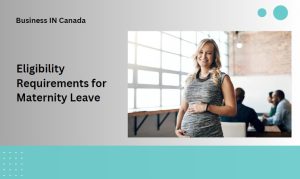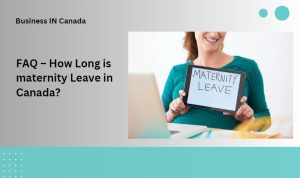Are you expecting a bundle of joy and wondering about maternity leave in Canada? Or are you curious about the maternity leave? Either way, you have come to the right place to know! Maternity leave is a vital time for new mothers to bond with their babies and recover from childbirth. In this blog post, we’ll explore what maternity leave is and how long is maternity leave in Canada. So sit back, relax, and let’s dive into this maternity leave
What is Maternity Leave?

There are a lot of questions surrounding maternity leave – what it is, how long it lasts, and what benefits are available. Maternity leave is a period of time that new mothers can take off from work to bond with and care for their newborn child. In Canada, maternity leave is governed by the Employment Insurance program, which provides up to 15 weeks of paid leave for new parents.
Maternity leave can be taken all at once or in smaller blocks of time, depending on what works best for the family. New mothers must have the time they need to adjust to their new role and bond with their babies. New fathers can also take advantage of paternity leave, which provides up to 5 weeks of paid leave. Depending on the family’s needs, these leaves can be taken consecutively or separately.
While maternity and paternity leaves are unpaid in the United States, many employers offer some form of paid parental leave in Canada. The amount and duration of this leave varies by employer, so it’s essential to check with your HR department to see what’s available. Some employers also offer flex-time or telecommuting options for new parents who want to return to work but need a little extra flexibility.
How long is Maternity Leave in Canada?
In Canada, the standard length of maternity leave is 17 weeks. However, some provinces offer an extended leave of up to 52 weeks. Therefore, the length of your maternity leave will depend on the province or territory in which you live.
If you are a pregnant working woman or have recently given birth, you may be entitled to take a leave from work. This maternity leave is intended to provide you with time to recover from childbirth and bond with your baby.
In Canada, the standard length of maternity leave is 15 weeks. However, some provinces offer an extended leave of up to 52 weeks. Therefore, the length of your maternity leave will depend on the province or territory in which you live.
You may begin your maternity leave up to 13 weeks before your due date. However, if you have a medical complication during your pregnancy, your doctor may recommend that you start your leave earlier. Your employer must give you at least two weeks’ notice before your rest begins.
Eligibility Requirements for Maternity Leave

In order to be eligible for maternity leave in Canada, you must have been employed with your current employer for at least 13 weeks before your due date. You must also provide your employer with a medical certificate that confirms your pregnancy and expected due date. In addition, if you plan on adopting, you must have completed the adoption process and custody of the child before you can begin your leave.
To receive maternity benefits from the government, you must have worked 600 insurable hours in the 52 weeks leading up to your due date or the date you begin your leave, whichever is later. If you are self-employed, you must have opted into an Insurance program for Self employees like Employment Insurance Program and paid premiums during that time.
Benefits Available During Maternity Leave
Several benefits are available to mothers during maternity leave in Canada. These include:
Employment insurance:
This federal program provides financial assistance to eligible workers who have lost their job due to no fault of their own. Mothers who are on maternity leave may be eligible for employment insurance benefits.
Parental benefits:
The Canadian government also offers parental benefits to parents caring for young children. Parents who are on maternity leave may be eligible for these benefits.
There are two types of parental benefits
- Standard parental benefits- within 52 weeks (12 months)
- Extended parental benefits- within 78 weeks (18 months)
Paid leave:
Some employers offer paid leave to employees caring for young children. This benefit is not required by law, but some employers offer it as an employee perk.
Flexible work arrangements:
Many employers are willing to negotiate flexible work arrangements with employees who have young children. This can include things like working from home, flexible hours, and part-time work.
Tax credits:
Several tax credits are available to parents with young children. These can help reduce the overall tax burden for families who are on maternity leave.
Child care subsidies:
Many provinces and territories offer subsidies for parents who need help with paying for child care. These subsidies can be used to help offset the costs of child care while a parent is on maternity leave.
Additional Resources and Support for New Parents

Several additional resources and support services are available to new parents in Canada. These include:
Parenting classes and workshops: These can help you learn more about caring for a baby and give you a chance to meet other new parents.
Home visits: A healthcare professional can visit you at home to offer advice and support on breastfeeding, sleep and other newborn care issues.
Support groups: Joining a support group can provide you with emotional support and practical advice from other parents who have been through the experience of having a baby.
Counselling services: If you’re finding it difficult to adjust to parenthood, counselling can be helpful.
How To Maximize Your Time on Maternity Leave?
Assuming you’re referring to the amount of time you have off work:
Planning ahead is the best way to maximise your time on maternity leave. Talk to your boss and let them know your estimated due date and when you plan to take leave. This way, they can start looking for a replacement and getting things situated at work so that the transition is smooth when you’re ready to come back.
If possible, try to take your leave a few weeks before your due date. Then, if there are any complications or you go into labour early, you’re already on leave and don’t have to worry about taking time off.
Use your maternity leave as a chance to bond with your new baby and relax. It can be tempting to want to get everything done around the house or spend time with friends and family, but remember that this time is for you and your baby. Instead, take advantage of this time off by sleeping when the baby sleeps, taking walks, and enjoying this particular time.
Conclusion
Maternity leave is a vital part of providing support to pregnant and new mothers in Canada. By understanding the rights and responsibilities associated with maternity leave, you can ensure that your transition into motherhood is as smooth and stress-free as possible.
With parental benefits such as extended maternity leave, access to medical care, financial assistance, job protection, and flexible work options available to parents in Canada, many resources are available for families who need support during this important time.
FAQ – How Long is Maternity Leave in Canada?

How long is paid maternity leave in Canada?
In Canada, the length of paid maternity leave is 15 weeks after delivery. However, this can vary depending on the province or territory in which you live. For example, the standard length of paid maternity leave in Ontario is 54 weeks.
There are a few things to remember when it comes to paid maternity leave in Canada. First, you must have been employed for at least 13 weeks before your due date in order to be eligible for paid maternity leave. Additionally, you must provide your employer with a medical certificate confirming your pregnancy.
Paid maternity leave is intended to allow mothers time to recover from childbirth and bond with their newborn. However, during this time, mothers are still entitled to all the benefits and protections afforded by their employment contracts, such as health insurance.
Is maternity leave 12 or 18 months in Canada?
Maternity leave in Canada is a minimum of 12 weeks but can be up to 18 months. The length of maternity leave is determined by the province or territory in which you live.
The Canadian government offers an Employment Insurance (EI) program that provides financial assistance to parents who are taking time off from work to care for a newborn or newly adopted child. To be eligible for EI benefits, you must have worked a certain number of hours over the past 52 weeks. The amount of money you receive each week is based on your average insurable weekly earnings.
You must have worked 600 insured hours in the last 52 weeks to receive the maximum benefit amount. The maximum benefit amount is $650 per week. If you have worked less than 600 hours, your benefit amount will be lower.
If you are planning on taking longer maternity leave, you may want to consider top-up payments through your employer. Some employers offer this as part of their employee benefits package.
How do I extend my maternity leave in Canada?
There are a few ways to extend your maternity leave in Canada. One way is to take unpaid leave. This means you can take up to an additional 35 weeks off for 52 weeks. Another way to extend your maternity leave is to use the government’s top-up program. This program provides an additional income replacement benefit for up to 15 weeks.
You can also extend your maternity leave by taking a leave of absence from work. However, this option is typically only available to women who have been employed for at least one year.
Is it better to have a long maternity leave?
There are pros and cons to having a long maternity leave. On the one hand, it gives the mother time to bond with her baby and recover from childbirth. It also allows her to ease back into work gradually. On the other hand, long maternity leave can be disruptive to the workplace and put a financial strain on the family.
Some countries, like Canada, offer up to one year of paid maternity leave. This is generous compared to other developed countries, which typically offer only a few months of paid leave. Unpaid leave is also an option in many places, but this can be difficult for families to afford.
The decision of how long to take maternity leave is a personal one that depends on many factors. It’s important to consider all the options and make the decision that’s best for you and your family.
How can I make money on maternity leave?
You can make money while on maternity leave in a few ways. First, you can look into government benefits, such as Employment Insurance (EI), which provides income replacement for a set period of time.
You can also consider taking on freelance work or consulting gigs during your leave. And, if you have savings put away, you can dip into that to help cover costs during your time off. Whatever route you decide to take, be sure to factor in the extra costs of having a baby and plan accordingly.










